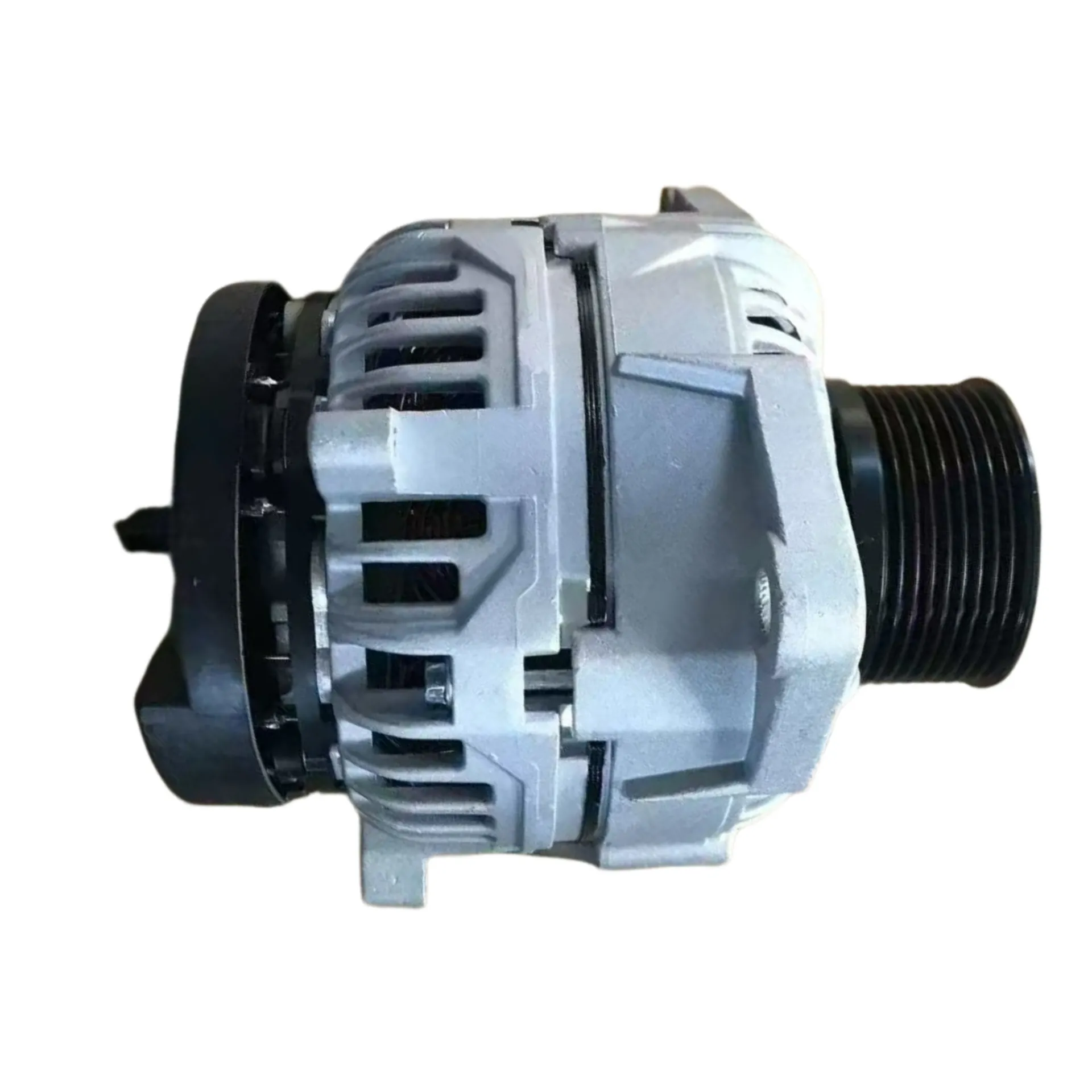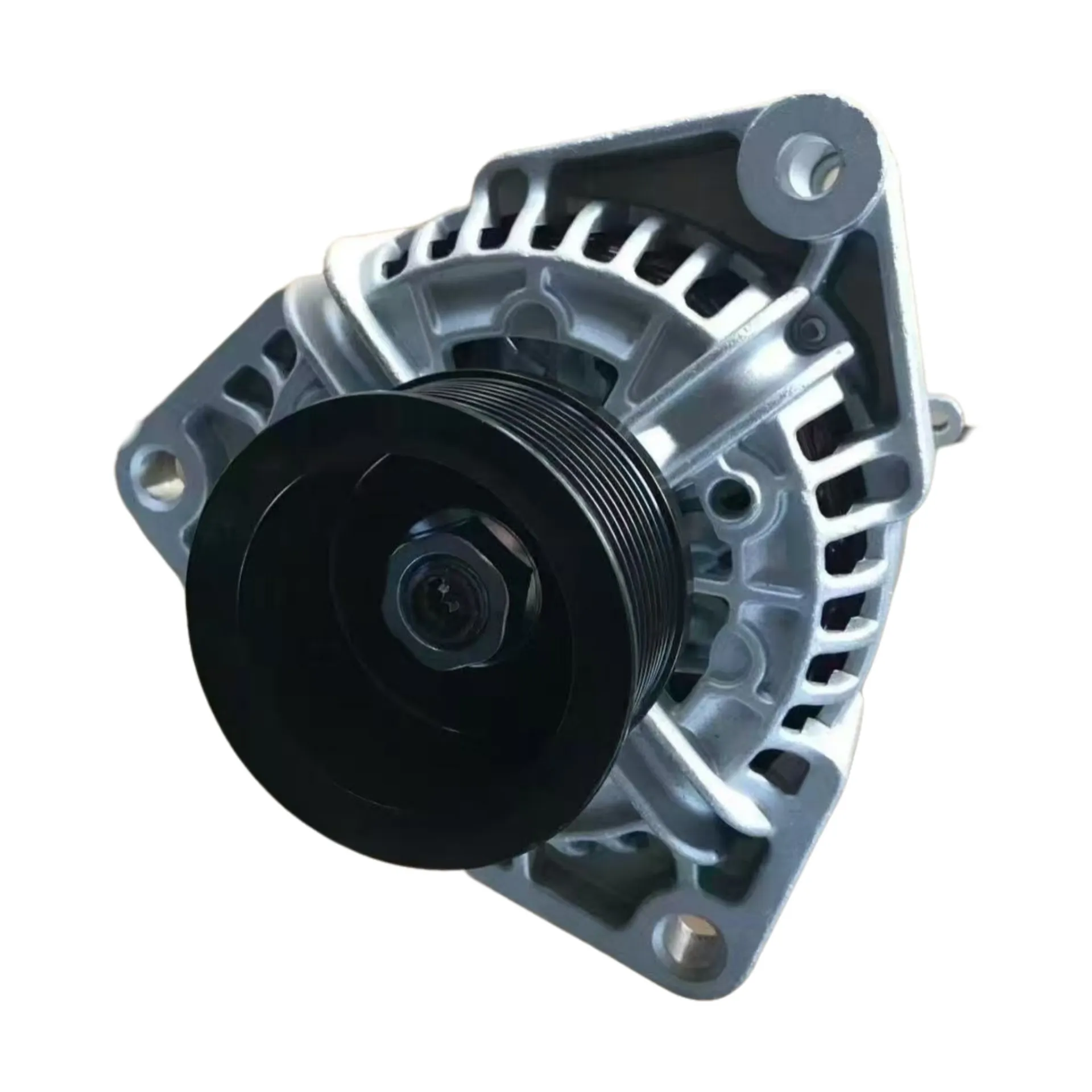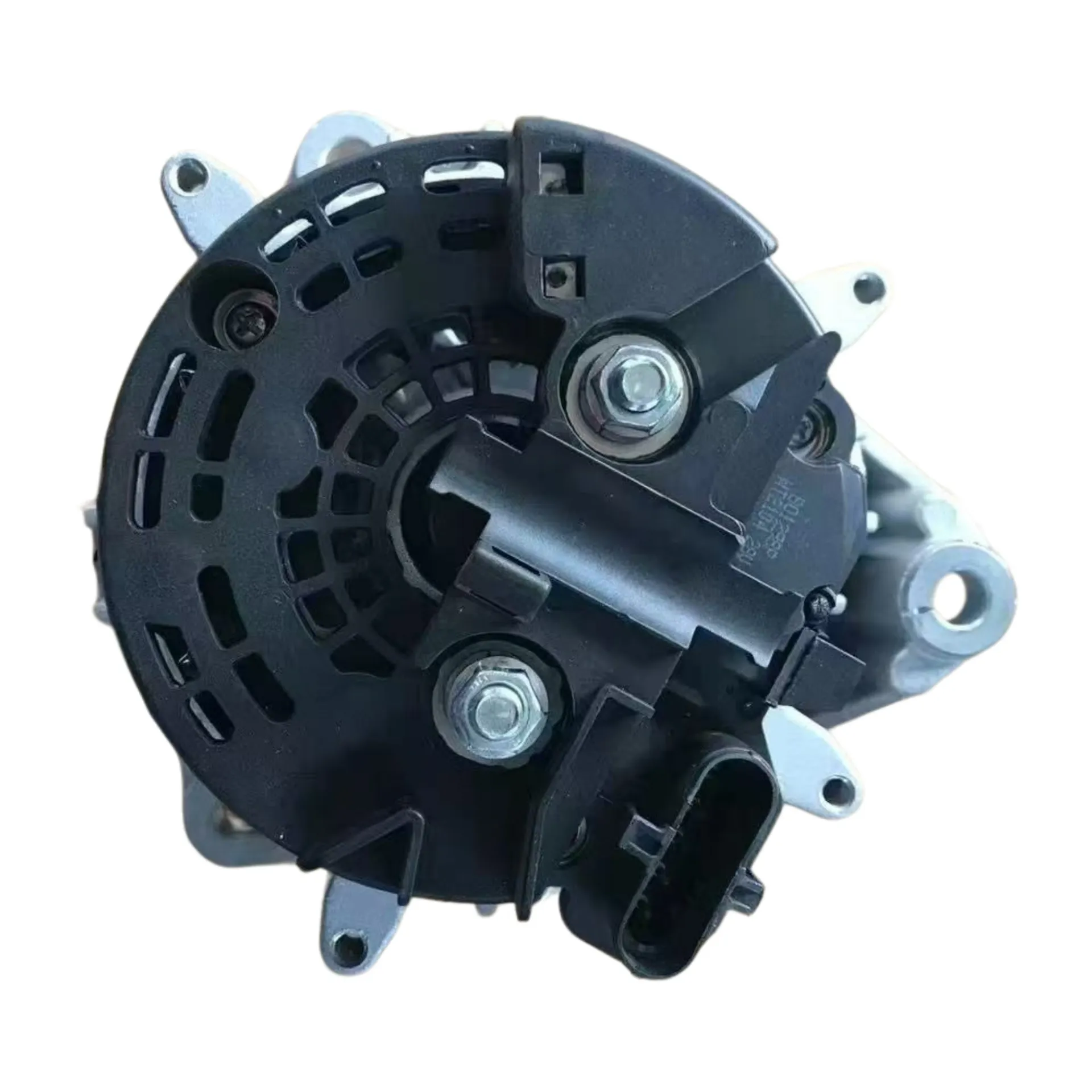Reliable Truck Alternators & 5KW Alternators For Sale
The Unseen Powerhouse: Navigating the Market for Heavy-Duty Truck Alternators
In the demanding world of heavy-duty transport, construction, and logistics, the reliability of a truck’s electrical system is paramount. At its core, the alternator stands as a critical component, converting mechanical energy into electrical power to keep the battery charged and operate all onboard electrical systems, from lighting and climate control to advanced telematics and safety features. The market for a robust truck alternator for sale is driven by an increasing demand for efficiency, durability, and technological sophistication, especially as vehicles integrate more complex electronic systems. Industry trends indicate a consistent shift towards higher output alternators, often ranging from 150A to 270A or even higher for specialized applications, capable of handling the substantial power requirements of modern trucks. Furthermore, the emphasis on reducing total cost of ownership (TCO) pushes manufacturers to engineer alternators with extended service life and minimal maintenance needs, ensuring fleet operators maximize uptime and profitability. This focus on reliability and performance is particularly vital for long-haul operations where breakdowns can lead to significant financial losses and logistical complications. For instance, an alternator like the Alternator 0124555002, specifically designed for Mercedes Benz Heavy-Duty Trucks, exemplifies the type of specialized engineering required to meet the rigorous demands of commercial vehicle applications, offering consistent power delivery under extreme conditions. The search for a reliable power source also extends to finding a high-quality 5kw alternator for sale, which caters to specific auxiliary power needs in various industrial settings.
Beyond basic functionality, contemporary truck alternators must demonstrate superior thermal management capabilities, vibration resistance, and electromagnetic compatibility (EMC) to operate flawlessly within a truck's confined and often harsh engine compartment. The evolution of alternator technology includes advancements in rectifier and voltage regulator design, leading to improved power output stability and reduced voltage ripple, which is crucial for protecting sensitive electronic components. As fleets increasingly adopt telematics and automation, the demand for stable and clean power from an alternator becomes even more pronounced. This necessitates sophisticated internal components, such as high-quality bearings for extended operational life and advanced copper windings for enhanced efficiency. Understanding these underlying technical requirements and operational environments is essential for any professional seeking a dependable truck alternator for sale that can withstand the rigors of continuous heavy-duty operation. The market also sees a rising preference for maintenance-free alternators, incorporating sealed bearings and robust brush assemblies designed for hundreds of thousands of miles of trouble-free service, directly contributing to lower operational costs and enhanced fleet efficiency.
Precision Engineering: The Manufacturing Journey of a Truck Alternator
The production of a high-performance truck alternator for sale is a complex process demanding precision engineering, advanced manufacturing techniques, and stringent quality control at every stage. It begins with the meticulous selection of raw materials: high-grade steel laminations for the stator and rotor cores, premium copper wire for windings, durable aluminum alloys for housings, and robust silicone diodes for the rectifier assembly. The manufacturing journey typically involves several key stages, starting with core fabrication. Stator and rotor cores are often created through precision stamping or casting processes to ensure optimal magnetic flux paths. This is followed by automated winding of the stator and rotor with insulated copper wire, a critical step where even minor inconsistencies can impact performance. Modern manufacturing facilities often employ robotic winding machines to achieve consistent tension and perfect coil geometry, essential for high efficiency and longevity. The rotor is then dynamically balanced to minimize vibration, a key factor in extending bearing life and overall alternator durability in harsh operating conditions.
Subsequent steps involve the integration of various sub-assemblies. The rectifier, which converts the alternating current (AC) generated by the stator into direct current (DC) for the truck’s electrical system, is assembled using high-capacity diodes and robust heat sinks to manage thermal loads. The voltage regulator, a sophisticated electronic component, is responsible for maintaining a stable output voltage regardless of engine speed or electrical load changes; its precise calibration is vital for protecting sensitive vehicle electronics. Housing components, often produced via die-casting or CNC machining from high-strength aluminum, are designed to protect internal components from environmental ingress and facilitate efficient heat dissipation. Once assembled, each truck alternator for sale undergoes rigorous testing protocols, including dyno testing to verify output current and voltage across the full RPM range, thermal cycling tests to simulate extreme operating temperatures, vibration analysis, and noise level checks. Adherence to international standards such as ISO 9001 for quality management and IATF 16949 for automotive quality ensures that every unit meets or exceeds original equipment (OE) specifications. For specialized applications requiring significant auxiliary power, a high-quality 5kw alternator for sale would follow similarly rigorous manufacturing and testing standards to guarantee reliable performance.

Fig 1: Advanced manufacturing processes ensuring the quality and durability of a truck alternator.
Technical Specifications and Performance Metrics
Understanding the technical parameters of a truck alternator for sale is crucial for matching the right component to specific application needs. Key performance indicators (KPIs) include output current (Amperes), nominal voltage (Volts), power output (Kilowatts), efficiency, and durability metrics like Mean Time Between Failures (MTBF). For heavy-duty applications, an alternator’s low-speed output is particularly vital, as trucks spend significant time idling or operating at lower RPMs, requiring sufficient current delivery even when the engine is not at peak speed. High efficiency translates directly into fuel savings and reduced heat generation, contributing to longer operational life. For instance, the Alternator 0124555002 for Mercedes Benz Heavy-Duty Trucks is engineered to deliver consistent, high output, designed to integrate seamlessly with the sophisticated electrical architecture of modern European trucks. Its design incorporates robust bearings and a highly efficient cooling system to withstand the high temperatures and vibrations common in engine compartments, ensuring a long service life, often exceeding 500,000 miles in typical applications. This longevity is supported by extensive validation testing, including thermal shock, vibration endurance, and salt spray resistance, verifying performance in extreme conditions.
The following table provides a comparative overview of typical specifications for heavy-duty truck alternators, including parameters relevant for a powerful 5kw alternator for sale, highlighting the critical aspects that differentiate performance and suitability for various demanding scenarios. These specifications are essential for procurement managers and engineers to assess an alternator's capability to power a vehicle's electrical load, including auxiliary systems such as refrigeration units, lift gates, and advanced telematics. The table also incorporates typical ranges and specific values that one might expect from a premium unit designed for long-term, high-demand service in sectors like petrochemical, metallurgy, and water treatment where consistent power supply is non-negotiable for critical operations. This detailed breakdown allows for a technical comparison of different models, focusing on the practical implications of each parameter for fleet reliability and operational efficiency.
| Parameter | Typical Range (Heavy-Duty) | Alternator 0124555002 (Example) | 5kW Alternator (Example) |
|---|---|---|---|
| Output Current (Amps) | 150A - 270A | 180A - 200A (Nominal) | ~350-400A (at 14V) |
| Voltage (Volts) | 12V / 24V | 28V (Nominal) | 14V (Nominal) |
| Power Output (kW) | 3.5kW - 6.5kW | Approx. 5.0kW (at 28V) | 5.0kW |
| Operating RPM Range | 800 - 18,000 RPM | 800 - 15,000 RPM | 1500 - 6000 RPM |
| Efficiency (%) | 65% - 80% | >75% | >80% |
| Operating Temperature Range | -40°C to +125°C | -40°C to +125°C | -30°C to +100°C |
| MTBF (Hours) | 50,000 - 100,000+ | >80,000 (Calculated) | >60,000 (Calculated) |
Application Scenarios and Strategic Advantages
The versatility and robustness of a quality truck alternator for sale make it indispensable across a multitude of heavy-duty applications. From long-haul trucking, where uninterrupted power is vital for driver comfort and safety systems, to demanding construction sites where equipment faces relentless dust, vibration, and extreme temperatures, the alternator performs its critical role. In the mining industry, heavy-duty trucks and specialized machinery operate in some of the harshest environments on earth, requiring alternators that can withstand corrosive elements, abrasive dust, and intense vibrations while providing continuous power for essential safety lighting and communication systems. Similarly, in the petrochemical and metallurgy sectors, robust alternators are crucial for powering vehicles and ancillary equipment operating near high-temperature processes or in potentially explosive atmospheres, necessitating components designed to meet stringent safety and operational standards, often including features like explosion-proof ratings. The precise engineering of an alternator like the 0124555002 for Mercedes Benz trucks ensures optimal performance in these challenging scenarios, exhibiting resilience against common failure modes seen in less robust units.
Beyond conventional uses, high-output alternators, including specialized units like a 5kw alternator for sale, are increasingly critical for commercial vehicles outfitted with extensive auxiliary equipment, such as refrigeration units in logistics, hydraulic systems in refuse collection, and advanced diagnostic tools in mobile service vehicles. The strategic advantages of investing in a premium heavy-duty truck alternator are multifold: enhanced fuel economy through higher efficiency and intelligent charge management, extended battery life due to stable voltage regulation, and significantly reduced downtime, leading to greater operational continuity and profitability for fleet managers. Advanced thermal management within the alternator design prevents premature component degradation from excessive heat, a common challenge in high-load, continuous operation environments. Furthermore, superior corrosion resistance, achieved through specialized coatings and material selection, extends the lifespan of the alternator in environments exposed to road salt, chemicals, or maritime conditions. These features collectively contribute to a lower total cost of ownership over the vehicle's operational lifespan, making the initial investment in a high-quality unit a sound economic decision for any heavy-duty fleet.

Fig 2: A heavy-duty truck alternator designed for reliability in diverse and challenging operational environments.
Customized Solutions and Manufacturer Commitment
When sourcing a truck alternator for sale, particularly for specialized fleet requirements or unique vehicle configurations, the ability to obtain customized solutions from a manufacturer is a significant advantage. While standard alternators like the Alternator 0124555002 for Mercedes Benz Heavy-Duty Trucks offer broad compatibility and high performance, certain applications may necessitate specific modifications in mounting, pulley type, voltage output, or even environmental sealing. Leading manufacturers often possess the engineering capabilities to adapt existing designs or develop entirely new solutions to meet these precise needs. This includes variations for different engine types, varying accessory loads, or extreme environmental conditions, ensuring optimal integration and long-term reliability. A manufacturer with decades of experience in the automotive and heavy-duty sectors demonstrates profound authority and reliability, often holding certifications like ISO/TS 16949 (now IATF 16949), which signifies a commitment to the highest quality management standards in the automotive industry supply chain.
The commitment of a reputable manufacturer extends beyond product customization to encompass comprehensive post-sales support, including detailed technical assistance and a robust warranty program. For fleet operators, this translates into peace of mind, knowing that expert help is available and that their investment is protected. For instance, a typical 2-year comprehensive warranty on a heavy-duty truck alternator for sale underscores the manufacturer's confidence in its product's durability and performance. This commitment to quality is reinforced by a clear delivery cycle, ensuring that replacement units or new orders can be fulfilled promptly to minimize vehicle downtime. Case studies frequently highlight instances where timely delivery of a high-quality alternator prevented prolonged operational interruptions for a logistics company or averted significant financial losses for a mining operation due to equipment idling. Such a track record of reliability and responsiveness builds considerable trustworthiness with B2B clients, distinguishing a premier supplier in a competitive market. Even for a specific power requirement like a 5kw alternator for sale, the same level of customization and support from a dedicated manufacturer is paramount to ensure seamless integration and optimal system performance.

Fig 3: A high-performance truck alternator showcasing robust construction and optimal heat dissipation.
Frequently Asked Questions (FAQ)
- Q1: What is the typical lifespan of a heavy-duty truck alternator?
- A1: A well-manufactured heavy-duty truck alternator for sale, like the 0124555002 for Mercedes Benz, is designed for a service life often exceeding 500,000 miles or 80,000 operating hours. Factors like operating conditions, maintenance, and initial quality significantly influence this. Using high-quality components and robust designs minimizes premature wear and contributes to this extensive lifespan, ensuring fleets experience minimal downtime due to alternator failures. Regular checks of the serpentine belt and ensuring proper ventilation can further extend the component's operational life in demanding environments.
- Q2: How does a higher amperage alternator benefit my fleet?
- A2: A higher amperage truck alternator for sale provides more electrical power, which is crucial for modern heavy-duty trucks equipped with extensive electronics, auxiliary lighting, refrigeration units, and telematics systems. It ensures the battery remains fully charged even under high electrical loads, prolonging battery life and preventing electrical system strain. This increased capacity is particularly beneficial for vehicles operating at idle for extended periods or those running auxiliary equipment without the main engine at high RPMs, contributing to overall system stability and reliability.
- Q3: Are there specific alternators for applications requiring a 5kw output?
- A3: Yes, a 5kw alternator for sale specifically caters to applications with high auxiliary power demands, such as mobile workshops, emergency vehicles, or trucks with specialized onboard equipment requiring significant continuous power. These alternators are engineered to deliver a stable 5,000 watts of power, typically at 12V or 24V, ensuring that all auxiliary systems operate without drawing excessive current from the vehicle's primary electrical system or risking battery depletion during prolonged use. They often feature enhanced cooling systems and heavy-duty components to manage the increased thermal load associated with higher power output.
- Q4: What warranty and support can I expect when purchasing a heavy-duty alternator?
- A4: Reputable manufacturers typically offer a comprehensive warranty, often 2 years, covering defects in materials and workmanship for a truck alternator for sale. This includes robust customer support for technical inquiries, installation guidance, and troubleshooting. A clear delivery cycle is also part of the service, ensuring timely supply. This commitment provides significant peace of mind for fleet managers, knowing that their investment is protected and support is readily available to minimize any potential operational disruptions. Look for manufacturers with strong industry certifications like ISO or IATF for added assurance of quality and service.
Conclusion: Powering the Future of Heavy-Duty Transport
The selection of a high-quality truck alternator for sale represents a strategic investment in the operational continuity and long-term profitability of any heavy-duty fleet. As vehicles become increasingly complex and integrated with advanced electrical systems, the demand for reliable, high-output alternators that can withstand the harshest operating conditions will only intensify. Manufacturers dedicated to precision engineering, adherence to rigorous quality standards such as ISO and IATF, and a commitment to customer support are essential partners for fleet operators. By prioritizing factors like efficiency, durability, and customized solutions, businesses can ensure their trucks are equipped with power sources that minimize downtime, enhance fuel efficiency, and protect sensitive electronic components, ultimately contributing to a lower total cost of ownership. The ability to source specialized units, such as a robust 5kw alternator for sale, further underscores the industry's capacity to meet diverse and demanding power requirements, positioning the heavy-duty transport sector for future growth and technological advancement.
References
- IEEE Transactions on Energy Conversion. (Various issues on Generator Design and Power Systems).
- SAE International. (Relevant standards and papers on Automotive Electrical Systems and Components).
- Journal of Manufacturing Science and Engineering. (Studies on Precision Machining and Assembly Processes).
- International Journal of Vehicle Design. (Research on Vehicle Performance and Reliability in Commercial Transport).





